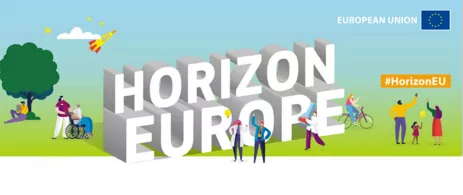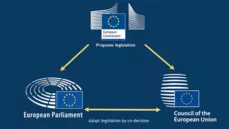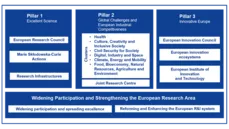
With new the year, the 8th European Framework Programme for Research and Innovation, better known as Horizon 2020, came officially to an end. However, financial support will of course continue: Over the next seven years, the successor program Horizon Europe will support research and innovation with a budget of around 95.5 billion euros. The process that led to this agreement was anything but easy.
Traditionally, EU’s budget cycle or also called Multiannual Financial Framework (short MFF) lasts for seven years. In parallel the European Framework Programme for Research and Innovation also runs for seven years, with Horizon 2020 coming to a closure on 31 December 2020. It is mainly the task of the European Commission and especially its Directorate General for Research and Innovation to design the content of the programme and decide what scientific fields should be in the focus of funding.

The EU budget depends heavily on a political agreement between the European Commission, the European Parliament, and the 27 member states of the European Union. This time, the road to this political agreement – especially against the backdrop of Brexit, the global pandemic and the rule of law clause – was very bumpy and lengthy. Although there was an agreement in December 2020, the long negotiations delayed the process and it is not yet entirely certain when we can expect the first Horizon Europe calls to be published. Launching the program "as soon as possible in 2021" is the European Commission's officially stated goal.
Horizon 2020 and its successor: Same same but different
In any case, better late than never, the agreement ensures that excellent research and innovation projects can continue to be supported by the European Union over the next seven years. Looking at the structure of Horizon Europe, one finds familiar modules again, but also newly introduced elements. From the outset, the European Commission has described the new program as an "evolution rather than a revolution" compared to H2020.
Like its predecessor program, Horizon Europe consists of three pillars:
1) Excellent Science including the European Research Council (ERC), the Marie-Sklodowska-Curie Actions (MSCA) and the Research infrastructures.
2) Global Challenges and European Industrial Competitiveness reinforcing technological and industrial capacities through in total six thematic clusters that address the full spectrum of global challenges (e.g health, mobility, space, energy, climate etc.)
3) Innovative Europe introducing the European Innovation Council (EIC), a new feature to provide support for emerging and breakthrough innovations by small end medium-sized enterprises (SMEs), start-ups and midcaps. The European Institute of Innovation and Technology (EIT) will also be integrated in this third pillar.

The first pillar will enable Europe's best researchers to push the frontiers of knowledge to address economic and social challenges, and will also foster the best talent in their skills. Complementing this, the second pillar supports collaborative research to find solutions to the global challenges of the future.
On to a new horizon
New under Horizon Europe are the so-called European Missions, with the help of which joint European projects are to be realized. Five mission areas have been identified with the goal of "achieving three million fewer cancer deaths, 100 climate-neutral cities, healthy oceans, healthy soils and food, and regions resilient to climate change by 2030," according to the European Commission. Another new element is a streamlined set of European partnerships. While under Horizon 2020 there was an almost unmanageable number of public-private partnerships between the European Commission and industry, here the structural goal is a much smaller number.
Mariya Gabriel, European Commissioner for Innovation, Research, Culture, Education and Youth is sure that “with the Horizon Europe programme, the European research community and research organisations can count on the world’s largest research and innovation programme as a main tool to strengthen Europe’s scientific and technology base.”
Basic research vs. innovation – European Parliament vs. the 27 Member States
During the negotiations, not only the total budget amount for Horizon Europe was discussed, but also the distribution of this budget among the different pillars of the program. Originally, the European Commission proposed a total budget of 100 billion euros for the next seven years to strengthen science in Europe and make it more competitive in the future. After EU leaders cut the budget to 80 billion euros, the European Parliament has since fought for a higher budget for the program.

While parts of the research community are disappointed, Christian Ehler, Member of the European Parliament and spokesman for Horizon Europe for the European People's Party, called the final agreement on 95.5 billion euros a "victory for researchers, scientists and citizens alike". Especially because in the end it was decided to give the ERC an additional billion euros. "This means that the program will ensure short- and long-term investments: Basic research, but also support for innovative technologies." Reliable long-term investment in basic research is paramount to achieving innovation, as the development of the Covid-19 vaccine has shown.
Horizon Europe tries to find a balance between basic and applied research, giving 27% of the total budget to Pillar 1, 55% to Pillar 2 and 14% to the third pillar. With 16% of the total budget Cluster 3 (Digital, Industry and Space) and Cluster 4 (Climate, Energy and Mobility) can offer the most funding for collaborative research within the second pillar.
Despite long negotiations, uncertainties remain
Although Horizon Europe can start in 2021 with this agreement, it is not yet clear exactly when the first calls will be issued. While the first Marie Curie calls are expected to be announced in May with a deadline in November - regularly in January - the first calls from clusters could be ready in April this year. It is likely that the first quarter, which is all about new calls for EU research funding, will be rather quiet.
The question of which countries will be associated with Horizon Europe has also not yet been finally answered. Following the UK's exit from the European Union, an agreement was reached between the UK and the EU to associate the country with Horizon Europe. This is good news for researchers working with British partners, although the exact timetable for association has yet to be confirmed. "The aim is for UK institutions to be able to participate from the outset," says the official EU-UK statement. Unfortunately, the UK will no longer participate in the Erasmus+ exchange program, but will launch its own new Turing scheme starting in September 2021. Regarding Switzerland's association with Horizon Europe and possibly Erasmus+, negotiations are still ongoing.
Conclusion: Horizon Europe as a tool for European resilience?
“The new Framework Programme for Research and Innovation for the period 2021 to 2027 provides a strong signal by the European Union for a competitive and forward-looking Europe. We will only be able to overcome the major challenges of our time, such as the Covid-19 crisis and climate change, as a community and with the combined efforts of all the member states’, underlines Anja Karliczek, German Federal Minister of Education and Research.
Horizon Europe may not be the program the research community hoped for, but it remains the world's largest research and innovation program and the main vehicle for European research cooperation. Europe must increase collaboration to have a resilient future in sight. Science and scientific breakthroughs on various global challenges are key to finding innovative solutions to threats such as a global pandemic. Covid-19 has shown how important science is and how strong we can be when we work together. Like many things, Horizon Europe is, in the end, a political compromise. A compromise that can help us all work together with our excellent partners to look for the innovative solutions of tomorrow. So, let's use it together!
If you are interested to find out more details about the new European Framework Programme for Research and Innovation, TUM is organising together with LMU a virtual Horizon Europe Kick-off event on February 10, 2021. For more information and registration, please use the following link.
If you have any questions, please contact Maria-Valerie Schegk.
Sources:
- https://ec.europa.eu/info/horizon-europe_en
- https://ec.europa.eu/commission/presscorner/detail/de/IP_20_2345
- https://www.consilium.europa.eu/de/press/press-releases/2020/12/11/horizon-europe-council-presidency-reaches-political-agreement-with-the-european-parliament/
- https://www.europarl.europa.eu/news/en/press-room/20201207IPR93246/research-meps-reach-deal-with-council-on-horizon-europe-programme
- https://sciencebusiness.net/live-blog/horizon-blog-research-and-innovation-next-eu-budget
- https://eurotech-universities-hle.eu/wp-content/uploads/2020/12/HLE-Key-takeaways.pdf
- https://www.ukro.ac.uk/Pages/eu_programmes.aspx
- https://www.gov.uk/government/news/new-turing-scheme-to-support-thousands-of-students-to-study-and-work-abroad